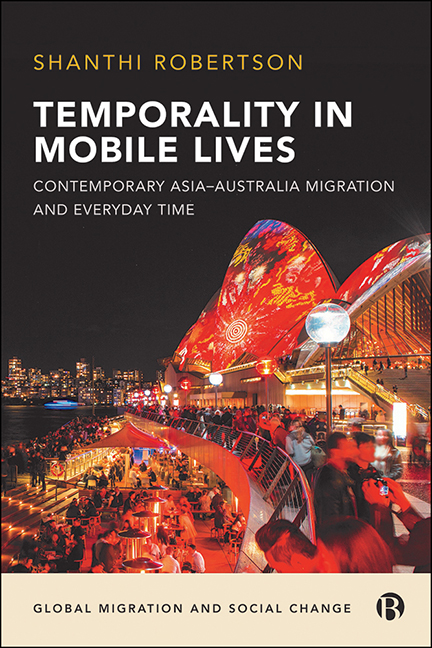Book contents
- Frontmatter
- Contents
- List of Figures
- Acknowledgements
- Series Preface
- Introduction
- 1 Chronomobilities: 21st-Century Migration and Lived Time
- 2 Asian Migrants of the Middle in Local and Global Context
- 3 Times of Work: Transified Workers and Contingent Careers
- 4 Times in Place: Moving, Dwelling, Belonging
- 5 Times of the Heart: Reconfiguring Intimacy
- Conclusion
- Notes
- References
- Index
Conclusion
Published online by Cambridge University Press: 04 January 2022
- Frontmatter
- Contents
- List of Figures
- Acknowledgements
- Series Preface
- Introduction
- 1 Chronomobilities: 21st-Century Migration and Lived Time
- 2 Asian Migrants of the Middle in Local and Global Context
- 3 Times of Work: Transified Workers and Contingent Careers
- 4 Times in Place: Moving, Dwelling, Belonging
- 5 Times of the Heart: Reconfiguring Intimacy
- Conclusion
- Notes
- References
- Index
Summary
I’m finishing this book in Sydney, just as the celebrations of the 2019 Lunar New Year, the Year of the Pig, are winding down. There have been night noodle markets, dragon boats on the harbour, lion dances in the squares, red lanterns gleaming from the trees in the parks. The airports and train stations have also been crowded. Thousands of Australian residents of East Asian descent travel out of Australia during the festival to celebrate with families and friends elsewhere in the world, but thousands of travellers also arrive in Sydney for the largest celebration of the lunisolar new year outside of China. The buzz of the festival used to be largely confined to Sydney's historic downtown Chinatown, but in recent years it has spread, with events held in outer suburbs and emerging inner-city hubs where East Asian migrants have increasingly settled since the turn of the century. Just as Lunar New Year has come to mark the beginning of the final month of Australian summer, in October, Deepavali, the Hindu festival of lights, will herald the beginning of our southern hemisphere spring. Although less ubiquitous (and perhaps, for now, less commodified) than Sydney's Lunar New Year, the South Asian festival is also increasingly celebrated in pockets across the city with food stalls, Bollywoodstyle and classical entertainment, and the traditional coloured lights, including in Martin Place, the ‘civic heart’ of the downtown business district. While Australia has a long history of celebrations of migrant culture, patterned by changing migration demographics since the Second World War, these 21st-century festivals are no longer contained within bounded ethnic communities. Rather, they are enmeshed into a cacophonous and complex urban diversity, celebrated to differing extents and with different layers of meaning by both visitors and locals, whose identities sit within, beyond and between the conventional boundaries of ethnic and diasporic community.
Sydney's Lunar New Year and Deepavali celebrations are gradually becoming engrained into the collective and cyclical temporality of the year, part of the evolving cultural calendar of an Asia-Pacific ‘global city’. They involve significant annual collective mobilities of people into, out of and across Sydney to take part in the festivities.
- Type
- Chapter
- Information
- Temporality in Mobile LivesContemporary Asia-Australia Migration and Everyday Time, pp. 179 - 186Publisher: Bristol University PressPrint publication year: 2021



